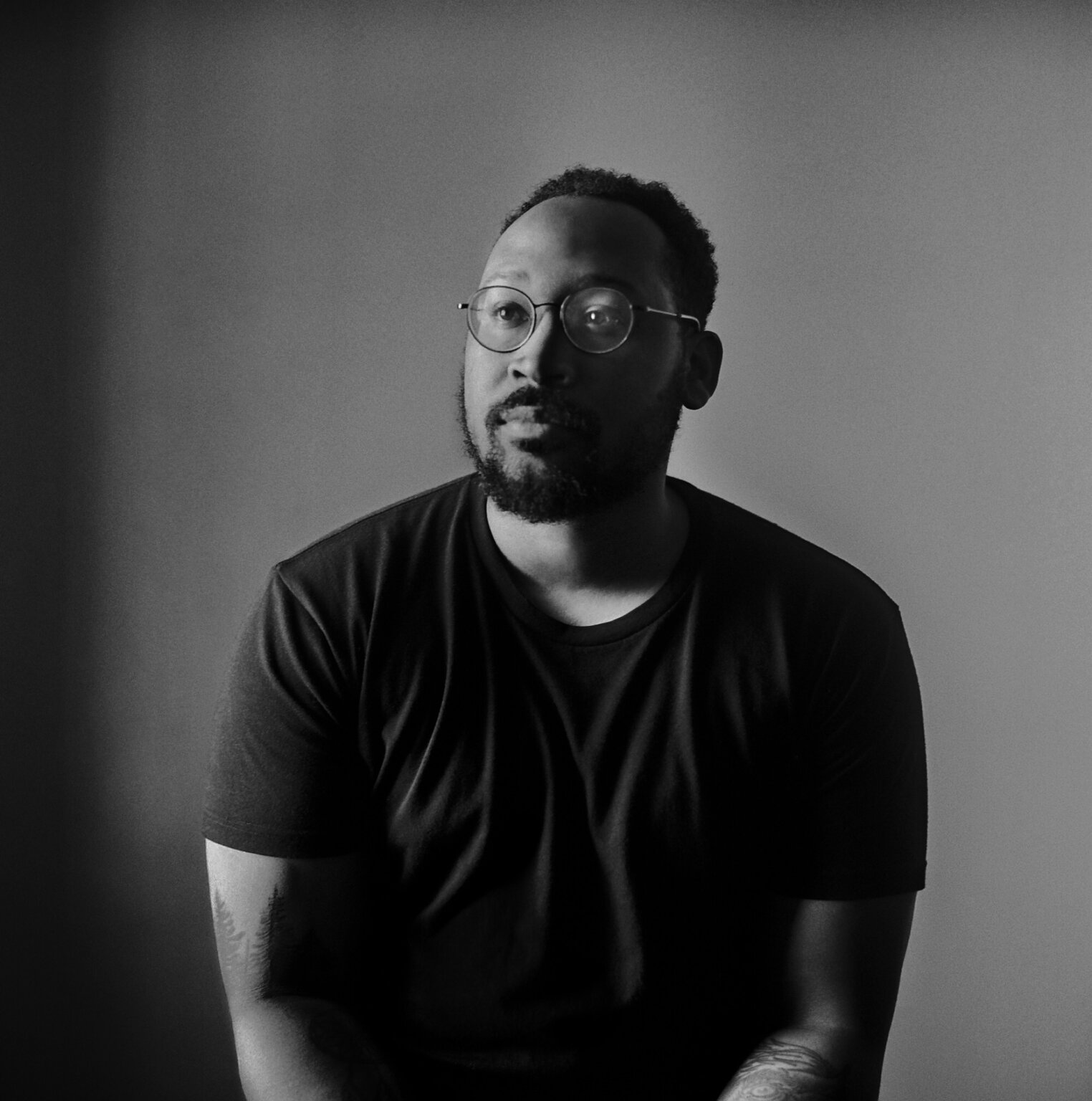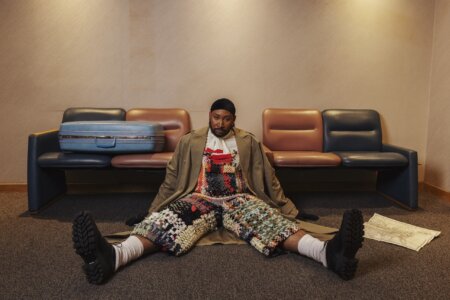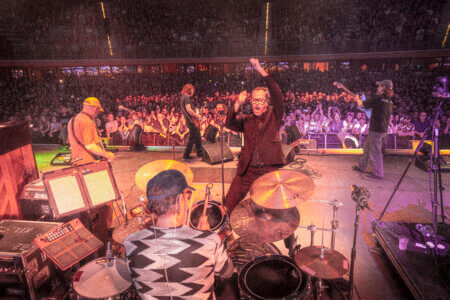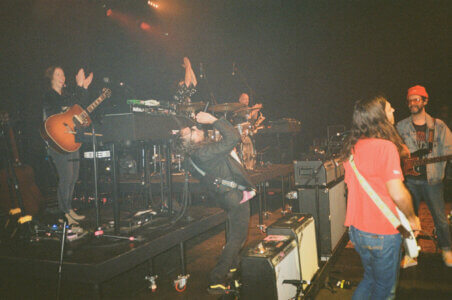Bartees Strange Is Hitting His Stride

If you were to chart out musicians by wealth, on one end you might have punk rocker/writer Aaron Cometbus, whose eponymous punk zine often detailed his low-rent adventures, such as living in office space. And the other end of the graph might be someone like Mick Jagger, who hangs out on private islands.
And in the middle, if all goes according to his plan, you’ll have genre-defying songwriter/musician Bartees Strange, born Bartees Cox, Jr., who wants to make beautifully eclectic music, like Live Forever, his debut LP, while also living a solidly middle class life devoid of both warming yourself against copiers and relaxing within yachts. “I don’t want to be poor,” he says. “I want to really make money and be inspired and support a family making music and by working with the artists who inspire me the most. I don’t think I need to be the biggest artist in the world to do that, but I know that I need to capitalize on opportunities, which I feel like I’m built for. “
Strange is all about work and opportunities. He began tracking Live Forever in an upstate New York barn in February 2019, finishing things up in July, with Will Yip coming in to remaster the album the following summer. The album is gathering media attention and adulation, coming on the heels of Say Goodbye to Pretty Boy, his EP of The National covers. It’s all part of a plan for the hard-working Strange, who frequently talks about the grind. He sees work as a necessary part of making art: “I think work is the pathway,” he says. “And I say this about Live Forever: I was the only person that thought I had a good album. I hit a lot of labels up, and nobody wanted the album. I really felt like I have something special here, but nobody gets it. And sometimes you’re the only one that knows what you’ve got and it takes extra work to prove it.”
The ability to grind toward making meaningful art is part of what draws Strange to The National. In addition to their music, Strange admires the arc of their career, which has seen them go from sparsely attended shows in Tulsa, where Strange first saw them over a decade ago, to multi- night residencies in Germany. But beyond that, they’ve succeeded in a way that’s allowed the band to retain their integrity and maintain their interpersonal band relationships. Strange recently left his full-time public relations job, a move that those from outside of music saw as risky. But The National keep Strange from getting too into his own head. “They have great friendships, they have families, they have great careers, they have money,” he says. “I look at them and I’m like, ‘Yeah, they kind of have everything.’ They disprove [those negatives] to me.”
He is particularly in awe of The National guitarist Aaron Dessner, whom Strange calls the “Michael Jordan of the indie world” and who has charted a uniquely personal and successful path through a business that often seems set-up exclusively to make sure musicians suffer emotionally, economically, and artistically. Dessner, who produced Taylor Swift’s 2020 Folklore, represents Strange’s Platonic ideal of the working musician. “[Dessner] literally started off in experimental rock bands, studied classical guitar, started The National, and is now a sought after pop producer,” Strange says. “He’s built his own world and that’s super inspiring to me, as someone who produces and writes music, to look at someone like Aaron Dessner and be like, ‘Yeah, you can build your own path.’ And you can do it all. Life is long.”
Strange also draws inspiration from his parents, whose stories figure prominently in his own, even taking center stage on his Bandcamp page. Strange’s father served in the military and his mother is a world renowned opera soprano. His mom used a church choir demo tape to get into a prominent music conservatory, escaping a rural life. Strange’s father similarly got out, using the military as an exit from a rough childhood. “A big part of me wanting to do music is mainly because of [my parents] inspiration and impact on my life,” Strange says. “My mom taught me everything about music. My dad taught me everything about following my dreams and not being afraid to go somewhere new.”
While Strange’s mom’s opera training might not seem like it would be particularly relevant to a pop artist, she actually gives him helpful notes after shows. “My mom is my biggest critic,” he laughs. She’ll let him know when something doesn’t sound right, and Strange credits the feedback with sharpening his ears. “She been right every time,” he says. Her correctness includes getting Strange to sing in a lower, more comfortable range. “So many songs on Live Forever were me learning how to modulate songs down two steps and then being like, ‘Okay, mom was right. This is better.’” Coming up through the hardcore scene, Strange conditioned himself to scream in a high register. “What was I doing?” Strange wonders now. “For 12 years, just tearing my voice to pieces trying to like sound like fucking Anthony Green or some shit. Trying to be cool. She was always just like, ‘Dude, be yourself. Do the thing that makes you great. You don’t have to sound like these white boys.’ That was kind of her message with everything.”
Family brought Strange back to Washington, DC from Brooklyn, after his parents and siblings relocated there. “I wanted to put myself in a place where I could maybe build some deeper roots and, Brooklyn, as much as I love it, I just knew there was no way I was going to actually have a long-term, sustainable life there,” Strange says. “I just couldn’t afford it.” DC’s more reasonable rental prices let Strange to do music full-time, even finding a studio three minutes from his apartment, allowing him to bike back and forth, making music throughout the pandemic.
That kind of life wasn’t possible in Brooklyn, which had a lot of strengths and weaknesses for Strange: “It’s literally the best place to be an artist and the worst place to be an artist at the same time,” he says. “Living in New York is like doing normal life on hard mode. You have access to every great musician you could possibly imagine. Also, every great musician you could possibly imagine is there. So your likelihood of anything good happening is dramatically lower than anywhere else.” DC’s slower pace allowed Strange to focus on Live Forever, as well as figuring out what he wanted to do with himself.
There’s more to DC than the relaxed lifestyle and real estate market, though. He appreciates the DC scene’s commitment to music. “They’re doing it because people don’t respect DC,” Strange says. “You’ve got L.A. and New York, where everyone goes to be famous. Chicago, Philly, and DC are where people go to just be heard.” The rich music clamoring to be heard is more than punk and hardcore, including everything from jazz to go-go to soul, with a thriving theater and opera community. This is Strange’s second time in DC, drawn there the first time because of its history with black rock bands from Chuck Brown, the Godfather of Go-Go, to Beauty Pill’s Chad Clark, to seminal punk band Bad Brains. “I remember reading about them and I was like, ‘Oh. DC is where you go to be a black rock and roll, hardcore person,’ Strange recalls.
As a Black man in America, Strange must always be aware of race dynamics, whether within music communities or simply walking down the street. This summer’s protests supporting Black Lives Matter and racial equality brought up complicated feelings. “It’s like seeing a movie a million times and then everyone else finally got to see it,” Strange says. “You’re like, ‘Yeah, I told you that that was real.’ And that’s how I feel about racism and systemic oppression among people of color in the United States. There’s millions of people, since the founding of this country, who have said these things exist and it takes these huge critical, sad moments for other people outside of that people of color world to come to grips with our reality. Because it’s their reality, too.”
Strange is well aware of the limitations of the United States as an institution, and the pandemic- riddled world in general, but he’s still optimistic, which is part of what led him to release an album right in the middle of COVID-19: wanting to be a part of the moment, however weird and dark it was. “I think the music is really hopeful and energizing and encouraging,” he says. “And I want people to feel that right now.” The timing is good in that Live Forever opened some doors for Strange, with other artists reaching out to collaborate with him. “I feel like I can ask some people for help now, that probably wouldn’t respond to an email or historically have not responded,” Strange says.
He’s open to working with outside producers on his next album, perhaps even having different producers for different tracks. While it’s Strange’s name on the marquee, and while he usually begins the tracks alone, he enjoys and appreciates the collaborative process to help with decisions. “Like I play piano, but I’m not a piano player,” he explains. “So I like having my piano player around when I’m about to record the final piano part. I’m like, ‘Yo, Graham [Richman]! Is this real, what I’m playing? Is this really doing what I think it’s doing?'” Strange is also playing with different guitar tunings, turning to artists like Jeff Buckley, Joan Baez, and John Denver for inspiration, but putting it through his own unique lens. “And it’s kind of fun,” Strange says. “Like ‘Oh! Willie Nelson uses this tuning all the time.’ But I’m going to use it for a pop punk song, or something. I think that’s a fun way to kind of re-adapt a tone palette. I think some tunings are associated with certain genres and certain types of songs and emotions. So to think that I could take them and make them do something new, it’s a lot of fun for me to play with.”
Strange isn’t looking for a big single leading to a huge payout. Instead, he’s trying to build something lasting, that’s not dependent upon going viral, but rather that’s based upon a deep connection with the audience. “Who wouldn’t want a career like that?” he asks. “Something that we can build sustainably over a long period of time and that’s undeniable. I aspire to that more so than having a big song. I want to make records for as long as I can.” It’s not about private jets as a proxy for artistic merit and it’s not about starving to prove one’s commitment; Strange wants to be comfortable in the middle.
Latest Reviews
Tracks
Advertisement
Looking for something new to listen to?
Sign up to our all-new newsletter for top-notch reviews, news, videos and playlists.









